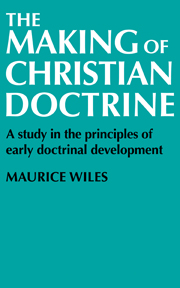Book contents
- Frontmatter
- Contents
- List of Abbreviations
- 1 The Development of Doctrine: The Nature of the Problem
- 2 Motives for Development in the Patristic Age
- 3 Scripture as a Source of Doctrine
- 4 Lex Orandi
- 5 Soteriology
- 6 The Form of the Arguments
- 7 The Assimilation of New Ideas
- 8 Towards a Doctrine of Development
- Index
6 - The Form of the Arguments
Published online by Cambridge University Press: 16 October 2009
- Frontmatter
- Contents
- List of Abbreviations
- 1 The Development of Doctrine: The Nature of the Problem
- 2 Motives for Development in the Patristic Age
- 3 Scripture as a Source of Doctrine
- 4 Lex Orandi
- 5 Soteriology
- 6 The Form of the Arguments
- 7 The Assimilation of New Ideas
- 8 Towards a Doctrine of Development
- Index
Summary
The doctrinal writings of the Fathers of the second half of the fourth century appear to us to be of a highly intellectual and speculative character. So indeed they are. But the evidence which we have considered so far has shown clearly enough that they were much more than an intellectual pastime, much more than the enjoyable exercise of the speculative imagination. In the eyes of the Fathers the presence of heresy made the task of doctrinal definition inevitable, while the close relation which they believed to exist between the doctrines being defined and the way of salvation made it not only an inevitable task but a vitally important one as well.
In the last three chapters we have been concerned with the main sources of doctrinal reasoning. But there is more to an argument than its source. We need to consider not only the grounds to which appeal was made, but also the way in which such appeals were conducted; not only the basis of the argument but also the pattern of argumentation is important.
The framework of thought in terms of which early doctrine was developed was provided by Greek philosophy. Our own approach to Christian faith is so firmly rooted in that tradition that it is not easy for us to imagine how it could ever have been otherwise. Père Danielou's book Théologie du Judéo-Christianisme, recently translated into English as The Theology of Jewish Christianity, is a useful aid towards such an act of historical imagination.
- Type
- Chapter
- Information
- The Making of Christian DoctrineA Study in the Principles of Early Doctrinal Development, pp. 114 - 140Publisher: Cambridge University PressPrint publication year: 1967

